| From California And
Montana With Lots 'N Between
If an alien had arrived in Britain in the 1960's it
would have seemed as though virtually everybody under
the age of thirty was a member of a group, related to a
group member or had friends who were members of groups.
That was the picture all over the country, not just
around the major popular music locations of Liverpool ,
London, Manchester, Birmingham and Newcastle.
Wolverhampton and its immediate area could boast more
than its fair share of groups of all musical hues. It is
now my intention to give a little more information about
some of those local groups and other notable individuals
and places in a sort of A-Z guide to the Wolverhampton
music scene in the 60s. If a particular group or
individual that you distinctly remember is missing or
the facts are not exactly correct, then I apologise in
advance.
Aaron's Rod
Previously known
as Jam Sandwich, the group emerged in late 1969.
It was apparently felt that the combination had gone as
far as it could with its former pop style. The group
took the opportunity of a stint at Hamburg's Top Ten
Club to sort out some new musical arrangements and
production. They returned to Britain with a new heavier
sound and a five-piece harmony. The group was managed by
Roy Kent. It included Kevin Bray on lead
guitar, Phil Whitehouse on Hammond organ, John
Waterfall on drums, Mick Farnell on bass and
Pete Goalby as lead vocalist. They made their
first local appearance in December 1969 at the Gibbons
Brothers' works dance. Many local enthusiasts regarded
the new group as one of the area's best. It was felt
that they would undoubtedly gain a fair amount of
commercial success. While this optimism did not prove to
be absolutely correct, Pete Goalby was to prove a really
outstanding vocalist. He was to sing later with Uriah
Heep.
|
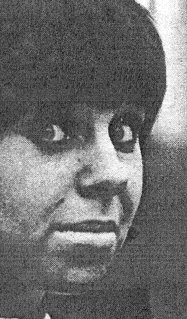
Jenny Wren.
One of the area's more successful songbirds,
actually making
it to the recording studio |
|
Jenny Allen (Wren)
The name of
Jenny Allen first came to local notice in 1964 when she
was a mere 15 year-old. She was originally backed by a
group called Les Jondors.
She signed a
recording contract in 1965 and took the name Jenny
Wren. She was still a pupil at the then Sir
Gilbert Claughton School in Dudley. She
apparently got her break as a result of Fontana's A&R
man, Jack Baverstock, (so influential with
Ambrose Slade) hearing her.
She released two
records on Fontana, Chasing My Dreams All Over Town
and
The Merry-Go-Round Is Slowing You Down.
She appeared at
the Civic with Manfred Mann and Wayne Fontana. Her later
backing groups were called the
Jackdaws, Outlook and Fashion.
|
|
Roger Allen
While he was not
a member of any of the groups, he was one of the most
influential and flamboyant personalities on the local
music scene. It was impossible to know him and not have
an opinion of him (good or bad, but never indifferent).
He began promoting in a very small way from his front
room in Merridale Street West in about 1963. He saw
himself as Wolverhampton's own Brian Epstein. His
earliest work was via the Social Club at Courtauld's
where he did an engineering apprenticeship. His first
group, the Strollers, developed out of Courtauld's.
Later he had responsibility for some of the area's most
successful groups like the Black Diamonds,
Californians, Finders Keepers, his personal
favourites, the Montanas, and the 'N Betweens.
He was one third
of the PMA organisation (Perry/Maddocks/Allen).
He formed his own agency with offices in High Street
Tettenhall, hiring Maurice Jones who was the
original manager of the 'N Betweens. He joined
with Astra to form Astra-Allen. In
November 1967 he announced he was leaving agency work
because of the pressures of other business interests.
Roger Allen was extremely successful in negotiating
recording deals for his groups.
|
| He managed to arrange an audition
for the 'N Betweens with Fontana and to this day
none of them has any idea how he managed it! It was just
typical of 'Mad Dog Cole' as he was known to the group.
He became their agent after their unfortunate
experiences in the Bahamas. By that time he was part of
the Nita Anderson Agency. In January 1968 he
opened the Oasis Club in Berry Street. During the
next few years he was to become involved in a number of
business enterprises, including time-share in Tenerife
and in Israel. All very typical of someone that Noddy
Holder calls a '60s version of Del Boy'. |
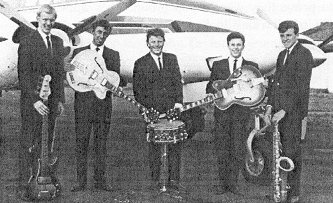
|
Strollers. The
first group to benefit from the Roger Allen
treatment were the Strollers, seen here at
Pendeford Airport where they did much of
their early rehearsing. (Tony Perry) |
|
|
Ambassadors
The group had
its origins in Wombourne. It first gained recognition in
the area as a result of a local council decision to stop
them from rehearsing in the village hall because of the
fire risk. They had created their own Ambassadors Dance
Club in the village. They became residents at the
Crystal Ballroom in Newcastle-Under-Lyme. This
encouraged them to turn professional. Amongst the early
group's members were Flash Stansford on drums and
vocals and Alfie Smallwood on organ who together
wrote a lot of the group's material. Nick Vance
was one of the lead vocalists but he left shortly after
the group made a demo disc. He had replaced Mark Wade.
Other members were Arthur Cole on bass, Bill
Pate lead guitarist and Steve Adey rhythm and
vocals.
|
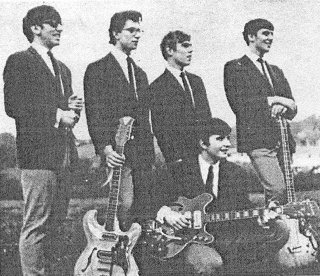
Ambassadors.
Made Wombourne wake up to beat music and achieved the
distinction of playing in Europe. They were seen by the
author on numerous occasions, including their appearance
on the Billy Fury bill at the Civic. |
The group visited Germany and was
relatively successful, being requested to stay an extra
month and appearing on German TV. They also played US
Air bases in Turkey with a girl vocalist from Birmingham
named
Vicki Holland.
It was while they were on their
way to play in Turkey that they were involved in a near
diplomatic incident. They were held at the Yugoslav
Bulgarian border and made to play for the border guards
to prove they were a pop group.
They appeared at the Civic Hall
with Billy Fury and the Gamblers. |
|
Ambrose Slade
The immediate
precursors of Slade. The group had originally
been called the Vendors and then the 'N
Betweens. The group comprised Noddy Holder
vocals, Dave Hill lead guitarist, Jimmy Lea
on bass and Don Powell on drums. The name Ambrose
Slade was introduced from the beginning of 1969 and was
apparently coined by Fontana's Jack Baverstock.
According to Jimmy Lea the name was a product of
Jack's secretary christening her various possessions
with names. Her handbag was Ambrose and her bag was
Slade so Jack took the two names and created the new
group. Apparently Jack Baverstock also felt that the old
name implied an element of homosexuality. There had been
some talk of the new name being Knicky Knacky Noo (the
group's own idea). It was as Ambrose Slade that the
group recorded the Beginnings album on Fontana,
gained a new agent in John Gunnell and a new
manager in Chas Chandler. While Beginnings
did not sell too well, it did prove the versatility of
the group. They played a wide range of prestigious
London venues like the Bag O' Nails, the Red Car Jazz
Club, the Marquee, the Temple (the former Flamingo) and
the Speakeasy.
|
| It was as Ambrose Slade that the
four members of the group had their hair shaved and
became regarded as symbols for skinheads (much to the
individual members' annoyance).
It was thought that this image led
to a decision by the Wolves to cancel an appearance by
the group at the Wolves Social Club in December 1969.
The image also affected relationships between the group
and some of their contemporaries. It was not long after
this that they became known simply as Slade. |
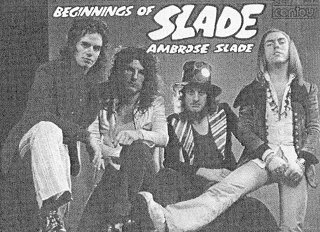
|
Ambrose Slade.
Seen here on the re-issued album cover of
Beginnings. |
|
|
Nita Anderson
People are apt
to get the impression that the only entertainment agency
operating in Wolverhampton during the 60's was Astra
but that was not the case, there was also the Nita
Anderson Agency. She began her promotional work in
Sedgley, using the local Parish Hall. It was her
promotions at the Ship & Rainbow that most
punters best remember. She brought a number of very good
acts to the Ship, including probably the most popular of
all the performers at the venue, Raymond Froggatt.
She managed a number of local groups, her first being
Derry Ryan & Ravens who she heard playing at the
Ellowes public house in Gornal. Other groups she looked
after included Choice, Scarlet Religion
and Revolver. It was while the 'N Betweens
were with the Anderson Agency that they got their
contract with Fontana and became Ambrose Slade.
Some of the people who worked for Nita's agency in the
60s include
Barry Dunn, the former vocalist with the
Mountain Kings and the Cobras, Jimmy Powell
who had some success in the early beat period with the
Dimensions, Don Fardon who had a major hit
with the record Indian Reservation in 1970,
Keith Evans, the former drummer with the
Californians and of course, the inimitable Roger
Allen.
Answer
Previously known
as the Sounds Of Three, comprising Mac Bailey
(one of the area's most outstanding performers) and
Phil Harris on guitars and Clive Simmonds on
drums. They changed their name in August 1966. They were
managed by Roger Allen. They supported both Neil
Landon and Tiffany. For a small group they were known
for having a full vocal sound.
Aristocrats
The group was
virtually 'adopted' by the United Services Club
in Wolverhampton. The club's chairman, Ernie Roden,
offered the group the facilities of the club for
rehearsal. The group played at the club's social
functions. They comprised Mike Perry on vocals,
Ian Robbins rhythm, Paul Keteringham lead,
Alan Hill drums and John Ellis on bass.
The group came together in 1963. Very little was heard
of them after early 1964. .
Arrangement
One of the names
used by the backing groups for Johnny Love. It
was with the Arrangement as his backing group that
Johnny played at Keele University's Royal Ball in 1967.
He remained in the forefront of the local group scene
for much of the second half of the 60s. He fronted the
Sceptres and Love's Lot.
Atlantics
Although the
group originated from Handsworth in Birmingham they
played in the Wolverhampton area throughout the period.
One of their first local engagements was during heavy
snow in February 1964 at the Stage & Sportsman's Club
which was located in Temple Street. They were a
trio who played R&B (Sweet Little Sixteen/
Roll Over Beethoven/Farmer John) with a very
solid beat in their early days. The group had Gary
Tipton on lead guitar, Tony Jones on bass and
Tony Felton on drums. They were one of the many
local groups who cut a demo (She's Sure The Girl I
Love/Zip A Dee Doo Dah) at the Domino
Studios in Albrighton which belonged to Andy
McLachlan. The group played at the first night of
the Stage Door Club in Dudley. They spent a short
time working with Johnny Washington. In 1965,
after appearing at the Grosvenor House Hotel, they were
offered the opportunity to play on a Mediterranean
cruise liner. The group continued to perform in the area
until the end of the decade.
Bachelor Four
One of the
town's original pop groups (1962), including Tony
and Alan Cropper, Derek Coppen and Bob
Rowley.
Band Of Joy
First emerged on
to the local scene in 1967, with their 'amazing' lead
vocalist, Robert Plant. From the outset it was
obvious to local punters that he was something special,
although few would probably have agreed when he was lead
singer with Listen. One night that is recalled by
many punters was when the band was playing at the
Ship & Rainbow and Robert Plant was forced to do an
unaccompanied session because of an electrical fault. It
proved to be tremendous. The band was involved in at
least one controversy when Robert formed a second Band
Of Joy from the group, Paper. It led to a dispute
with the original group's management over the name of
the group. The new group had Keith Hammond on
lead, Paul Lockey on bass, John Thompson
on drums and Chris Brown as organist. It was a
much more blues-oriented group. It was in that form that
they supported Tim Rose while on tour in 1968. It was in
the summer of 1968 that Robert Plant left the group,
along with the group's drummer at the time, John
Bonham, and joined Jimmy Page's New Yardbirds
which would become Led Zeppelin. Robert Plant did
play for a very short time with another group called
Obs Tweedle, immediately before joining Page. He
still performs locally with Priory Of Brion.
Big Beats
Better known as
the Wolves, they became the Big Beats after
changing from their original name of Gerry Sinclair &
Sellakats. The new name was probably part of the
revamping of the group by their manager, Geoff Jacobs.
He was a town dress shop owner who got involved in the
emerging beat scene. He successfully pushed the group to
the forefront by promoting appearances by well-known
groups (Searchers at the Civic Hall in 1964) with his
own group in support. He also managed to get the group
TV appearances on For Teenagers Only. The
original group included Frank Littleford on
vocals, Darryl Smith on bass, John Eades
on lead, John Taylor on drums and Wim Feder
on rhythm. Pye signed the group in 1964. By the time the
group released their first record they were called the
Wolves.
|
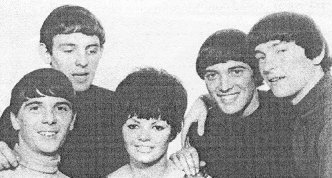
|
Black Diamonds.
The group best remembered by locals from the
pre-beat days. Seen here with Sheila Deni
who proved such a success during the group's
visit to Germany. |
|
Black Diamonds
For many
Wulfiunians, they represent the original local pop
group, although their origins lay in the skiffle craze
of the mid-50s. Lead guitarist and vocalist Derek
Coppen formed them in 1956 with Keith Lansley
on drums, Brian Lansley on bass, Peter Emerson
on rhythm. They were possibly the first local group to
use electric guitars which might explain how they
managed to get a 'residency' at the 'legendary'
Milano coffee bar in Darlington Street.
|
| During the next few years a
number of personnel changes occurred with people like
Malcolm Bradford,
Pete Spooner, Les Parker, Bob Wilkins,
Eddie Cheetham and Kevin Calloway playing
with the group. They were one of the first local groups
to visit Germany with a line-up of Pete Spooner,
Peter Abberley, Roger Clarke, Keith
Evans and Sheila Deni. That group was managed
by Roger Allen and was to form the basis of the
original Californians.
Black
Velvets
The group
originated from the Bridgnorth area. They had come
together in the late 50s and continued to play into the
early 60s. The lead singer was Selwyn Bowen who
specialised in Karl Denver-style numbers. They played in
the Wolverhampton area but they mainly concentrated in
the surrounding rural areas of Worfield, Claverley,
Enville, Kinver etc. Other members of the group were
Alan Tarlin, Trevor Baker, Geoff Foxall
and David Warboys.
Blues Ensemble
A
Birmingham-based group which John Howells joined
after leaving the 'N Betweens in 1966. They
originated as a four-piece but developed into a
seven-piece blues oriented group with John doing lead
vocals. They had a very good sound and were regarded as
something of a group's group. They were also known as
Ensemble. They played many of the leading London
clubs during 1966.
|
|
Bossmen
Group originated
out of Walsall in about 1963 with Chas Peate as
their manager. They were regarded as a very polished,
professional group who impressed most observers. They so
impressed the Who that it was suggested that they
be signed by Robert Stigwood. They were
originally formed by Norman Beddow, the brother
of Len Beddow, who played with Danny Cannon
and Herbie's People. The original group included
Bernie Howell on lead guitar, Steve Shirley
on bass, Roy Knight on drums and Percy Davies
on organ. |
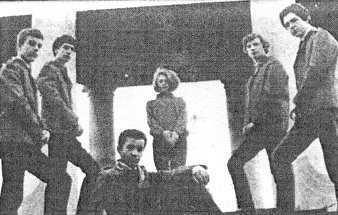
Bossmen.
One of the better local groups never to have made it.
The organ playing of Percy Davies (foreground) was
exceptionally good. |
| One of the group's later members
was John Beattie who was a founder member of
Ides Of March. They appeared at both the
Whiskey-A-Go-Go and Marquee clubs in London. They
disbanded in the summer of 1967 with Percy Davies,
probably the most outstanding member of the group,
seeking to form a new group. The group is possibly best
remembered for the controversy that surrounded Percy
Davies when he was refused admission to the
Bilston United Services Club in 1966 because of his
colour. The group who was playing that night,
Herbie's People, cancelled their Thursday night
sessions at the club in protest.
John
Bradford
First came to
local prominence as the lead singer of Brad Ford &
Sundowners. He had more success as a member of the
Ides Of March. His father Bob was the
manager of the group. He left the group for personal
reasons and pursued a solo career as John Ford.
He recorded for Phillips from 1968 to 1970. His first
record was Two’s Company, Three s A Crowd, part
written by Willenhall song-writer Martin Hall. It
was credited with being an exceptionally good first solo
effort. In 1969 he released I Know It’s Love which had
something of a Tom Jones style about it and sold quite
well in local shops. He released three more records as
John Ford. He later recorded as Eli Bonaparte.
|
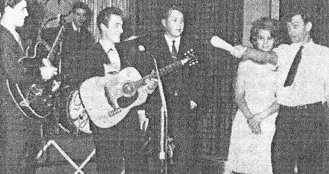
Steve Brett
& the Mavericks. The first
local group to make a TV appearance. Here they are seen
receiving instructions from producer Reg Watson, during
rehearsals for For Teenagers Only. Mair Davies
can be seen alongside Reg Watson. (Steve Brett) |
Steve Brett
(& Mavericks)
One of the
originals of the local music scene. He formed his first
group in 1957 but it was his success with the Big Beat
Contest at the Gaumont in early 1962 which really
brought him to local notice.
The group of
Mavericks, which won the contest, comprised, Gary
James on drums, Ricky Dene on bass and Rob
Nelson
on lead. Their victory came after the non-appearance of
the Jaguars.
|
| Steve was the first local pop
entertainer to get on TV when he appeared on Up And
Doing in June 1963 with Denny Laine & Diplomats
and with Janice Nicholls as the compère.
By October 1963 the Mavericks were appearing as the
resident group on ATV's For Teenagers Only. The
Mavericks at that time included the guitarist Dave
'Toffee' Holland who was going to gain international
recognition as a jazz instrumentalist.
In October 1964 Steve took on a
new set of Mavericks in the form of the
Memphis Cut-Outs from Walsall. This new group
included Neville 'Noddy' Holder. Steve recorded
for Columbia and released three singles during 1965. The
first record was Wishing, followed by Sad,
Lonely And Blue and then Sugar Shack. While
none of the records made any impact on the national
charts, they were very popular in the local area. The
group went over to Germany and split up on their return.
Steve continued to play mainly C&W. He is still
performing on the club scene in and around Blackpool
where he now lives. |
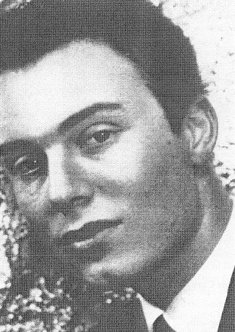
Steve Brett.
Eat your heart out James Garner! (Steve Brett) |
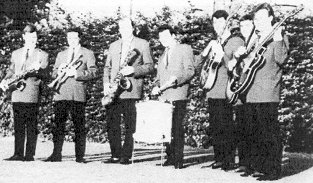
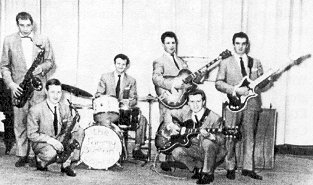
Tommy Burton
Combo. Two line-ups of the
great Mr. Burton’s boys. (Tommy Burton) |
Tommy Burton
He was a legend!
It is exceptionally difficult to quantify the importance
of Tommy Burton to the local music scene. He was the
example that so many young musicians followed in the
early years of the local music scene. He established his
Combo as a Rock 'n' Roll band, modelled very much on
Bill Haley's Comets. He began playing shortly after
leaving the RAF in 1958, although he had won a skiffle
competition as Thunderfoot Burton and the
Ravemen before his demob.
His early combo
attempted to capture the original Rock 'n' Roll sounds
of Bill Haley and others. His bands included some of the
most outstanding local musicians of their time, people
like
Horace Johnson, Colin Burton, Dennis
Harvey, Pete Graystone, Mac Bailey,
Mac Woolley, John Garrett, Dave Holmes,
Phil Harris, Scotti Wood, Don Maddocks,
Brian Meacham and Trevor Worrall.
|
|
It was Tommy who
began many of the music sessions at a wide variety of
local venues like St. Paul's Hall,
Staffordshire Volunteer and the Three Men In A
Boat. About 1965 he decided that the way music was
going was not really his scene and he returned to his
first love, jazz. There were still times when the Combo
re-appeared, especially at Shepwell Green, and
they still showed that Rock 'n' Roll was alive and
kicking. Throughout Tommy's last illness the Combo
continued to perform. He died in 2000 and received an
amazing New Orleans style funeral. A true great!
|
 |
 |
 |
Return to
the
previous page |
Return to
the Contents |
Proceed to
the
next page |
|